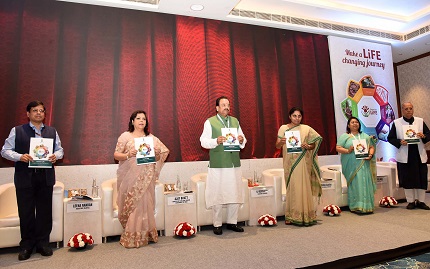On World Tourism Day 2023, the Ministry of Tourism, Government of India, orchestrated the global launch of “Travel for LiFE,” a pivotal program under Mission LiFE, dedicated to the tourism sector. This initiative, in collaboration with the Ministry of Environment, Forest and Climate Change (MoEFCC), United Nations World Tourism Organization (UNWTO), and the United Nations Environment Programme (UNEP), took place at Bharat Mandapam, New Delhi.
The event was graced by the presence of distinguished figures, including Mr.Ajay Bhatt, Minister of State of Tourism and Defence; Ms. V. Vidhyavathi, Secretary (Tourism); Ms. Leena Nandan, Secretary of Ministry of Environment, Forest and Climate Change; Mr. Rakesh Kumar Verma, Additional Secretary, Ministry of Tourism, alongside other officials.
Mr. Ajay Bhatt highlighted “Travel for LiFE” as a testament to India’s commitment to fostering sustainable tourism. He emphasized that the recent G20 Leaders’ Summit showcased India’s dedication to global unity and collaboration, aligning with collective aspirations for a sustainable future. He encouraged travelers, businesses, and citizens to embrace this program, pledging to travel responsibly, respect the environment, and appreciate the rich diversity of our world. The Travel for LiFE program, a facet of Mission LiFE, charts the course toward a sustainable planet Earth.
Ms. V. Vidhyavathi provided an overview of Travel for LiFE, emphasizing its multifaceted dimensions. The program seeks to inspire tourists to undertake simple actions that contribute to environmental conservation, biodiversity preservation, local economic improvement, and the preservation of the socio-cultural fabric of local communities. It aims to foster conscious and deliberate resource utilization across the tourism value chain.
Ms. Leena Nandan underscored that Mission LiFE aims to promote sustainable lifestyles through mindful resource use. She stressed that addressing climate change requires positive and proactive environmental actions by governments, organizations, and individuals.
Mr. Rakesh Kumar Verma, in his welcome address, highlighted the G20 New Delhi Leaders’ Declaration (NDLD), which recognized tourism and culture as catalysts for sustainable socio-economic development and prosperity.


The event marked the launch of the Travel for LiFE program across two verticals: Travel for LiFE for Cleanliness, a national campaign to clean tourist sites and monuments in alignment with the Swachhata campaign, and Travel for LiFE for Rural Tourism, encouraging tourists to explore rural and lesser-known regions, thereby promoting sustainable rural tourism and empowering local communities.
The “Travel for LiFE” program aligns with Sustainable Development Goals (SDGs), including Decent Work and Economic Growth (SDG 8), Sustainable Cities and Communities (SDG 11), Responsible Consumption and Production (SDG 12), Climate Action (SDG 13), and Life Below Water (SDG 14). With its broad range of actions, Travel for LiFE, directly and indirectly, contributes to almost all the SDGs.
The event also marked the launch of the national “Tourism for Tomorrow” competition for case studies and best practices, aligning with the key priorities of the Goa Roadmap. The Ministry of Tourism will recognize and support SDG-driven Tourism Best Practices in India through this competition.
Additionally, a Design Challenge competition for Institutes of Hotel Management affiliated with NCHMCT (National Council for Hotel Management and Catering Technology) under the Ministry of Tourism, Government of India, aims to develop innovative solutions in the field of edible cutlery.
In line with the Swachhata campaign, the Ministry of Tourism, Government of India, has planned a massive cleanliness drive at 108 identified tourist locations. This initiative aims to ensure cleanliness, sanitation, and the reduction of single-use plastic while promoting eco-friendly alternatives. Students from schools and colleges, as well as members of Yuva Tourism Clubs (YTC), have been actively involved in this campaign.
The event was also recognized and awarded the Best Rural Tourism Village Awards, celebrating their efforts in cultural heritage preservation and sustainable development through tourism. Awards were presented to 35 Rural Tourism Villages, with distinctions in Gold, Silver, and Bronze Categories.
Also, read
The hospitality industry has a task cut out to achieve sustainability goals – Nakul Anand
Watch on Youtube
